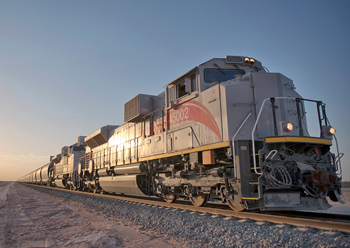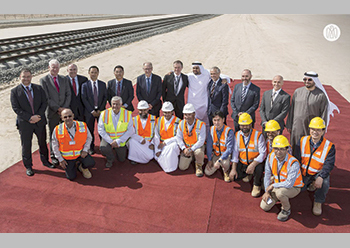Etihad Rail Phase Two gathers steam
Work is set to begin shortly on two further stages of the second phase of the Etihad Rail, for which contracts worth $4.9 billion have been awarded over the past year.
01 June 2020
Following the recent launch of works on packages A and B of Stage Two of the Etihad Rail, the developer and operator of the UAE’s national railway is gearing up for the ground-breaking on two other packages – C and D, sources have revealed to Gulf Construction.
Civil works and construction are due to start shortly on Package C, which runs for 94 km, and Package D, which covers a distance of 145 km, of the Second Stage of the Etihad Rail network.
Contracts worth Dh18 billion ($4.9 billion) have been awarded for Phase Two of the network, Mohammed Rashid Al Marzouqi, the Executive Director of Relations at Etihad Rail, said last month in an interview to the Emirates news agency Wam.
Stage Two will extend 605 km from Ghuweifat on the border with Saudi Arabia to Fujairah on the east coast, to be followed by future route additions. The network will connect the emirates via Abu Dhabi, Khalifa Industrial City (Kizad), Khalifa Port, Jebel Ali Port, Dubai, Sharjah, Ras Al Khaimah and Fujairah on the East coast, linking with the existing line at Ruwais (Stage One), effectively uniting the major industrial ports and trading centres of the country.
Stage One is fully operational and was delivered on schedule and within budget in 2016. The route spans 264 km, transporting granulated sulphur from sources at Shah and Habshan to the export point at Ruwais.
 |
|
The 264-km Stage One, which was delivered in 2016, is transporting granulated sulphur from sources at Shah and Habshan to Ruwais. |
The entire Etihad Rail network will span approximately 1,200 km, connecting the UAE to Saudi Arabia from Fujairah Port to Ghuweifat, and will form an integral part of the proposed GCC Railway.
Package C was awarded in June last year to a joint venture of China Railway Construction Corporation (CRCC) and Ghantoot Transport and General Contracting Company, which is also carrying out works on Package B of the rail network. These two packages link Khalifa Port, Kizad, and Jebel Ali Port and are valued at Dh4.4 billion. The works on this part of Stage Two focus on the design and construction of rail infrastructure, including earthworks, bridges, tunnels, animal crossings and track-laying, connecting Package B with Package A, and Package C with Package B.
The Dh4.6-billion contract for the civil works and construction of Package D was awarded at the end of last year. Package D will link the ports of Fujairah and Khor Fakkan to the network at the Dubai border with Sharjah, and stretches over a distance of 145 km. Through linking key ports to manufacturing, production and population centres, Package D will connect to building material quarries in the Northern Emirates, contributing to the improvement of the transport and infrastructure industries in the UAE.
The deal for Package D went to a joint venture of the CRCC and National Projects and Construction (NPC). It includes the construction of 15 tunnels through the Hajar Mountains extending a total length of 16 km, in addition to the construction of 35 bridges and 32 underpasses.
Linking the ports of Fujairah and Khor Fakkan to the railway network will allow the transportation of up to two million TEUs (twenty-foot equivalent container units) per year, thus promoting international trade. In addition, Etihad Rail trains will carry up to 30 million tons of construction material annually to distribution centres in Abu Dhabi and Dubai, cutting the overall cost of transport and reducing on-road truck trips by more than 2,000 journeys per day.
Etihad Rail has previously awarded contracts for the design and build of Package A of the second stage to a joint venture between the China State Construction Engineering Corporation and South Korea’s SK Engineering and Construction. Construction work on this package was launched in January this year. Package A will extend 139 km from Ghuweifat on the UAE border with Saudi Arabia to Ruwais, where it connects with Stage One of the network. The package will utilise 700,000 cu m of ballast, involve 30 million tons of earthwork and the installation of over 450,000 concrete sleepers provided by Etihad Rail’s own manufacturing plant, which produces up to 45,000 railway sleepers each month.
Launch of work on Package A coincided with the signing of a contract between Etihad Rail and a joint venture of Larson and Toubro (L&T) and Power China International, to construct freight facilities for the railway network at a total cost of Dh1.87 billion. Under the terms of the contract, the two companies will be jointly responsible for the surveying, design, construction, equipment installation, testing and pre-commissioning of each facility.
Etihad Rail is building a series of freight facilities in Ruwais, Industrial City of Abu Dhabi (ICAD), Khalifa Port, Dubai Industrial City (DIC), Jebel Ali Port, Al Ghayl and Siji, Fujairah Port and Khor Fakkan Port capable of undertaking all loading and unloading operations, in addition to providing container storage and maintenance.
The planned port facilities will provide a full service to Etihad Rail customers, including direct access to trains on the dock, easing container movements between ships and trains. These facilities, will become the UAE’s main rail transit system for local, regional and international distribution and logistics, with bonded storage and customs on-site.
The other facilities centres will serve several sectors, including building materials, as they will contribute to transporting more than 30 million tons of various types of raw materials from their sources in the north of the country to the main markets in Abu Dhabi and Dubai for use in the construction industry.
Civil works on Package B was launched at the end of March. This package extends over 216 km and includes the construction of a second concrete railway sleeper factory and rail routes to Kizad, Khalifa Port, and the ICAD.
Among other contracts, a Dh846-million deal for the construction of the central operation and maintenance (O&M) facility at Al Faya, Abu Dhabi, was awarded to a joint venture led by Vinci Construction France. The facility will be the largest and the most important one on the network; it will be responsible for warehousing, installations, operations, and the maintenance of locomotives and wagons. The facility will also include an administrative building to control the operations of the whole network.
Etihad Rail is also expected to award a contract this year to a wagons supplier – tenders for which are currently open for submissions, according to sources. The successful bidder will manufacture, supply and commission wagons for the entire rail network. Seven types of wagons are being procured including flat container, single-well double-stack container, five-pack articulated double-stack container, uncovered and uncovered aggregate hopper, side dump hopper and bulkhead flat wagons.
This follows the award of a contract in February for the supply of locomotives to Progress Rail Locomotive, a Caterpillar company, which will expand Etihad Rail’s fleet to 45 locomotives – six times the current fleet consisting of seven locomotives.
Sheikh Theyab bin Mohamed bin Zayed Al Nahyan, Member of the Executive Council, Chairman of Abu Dhabi Crown Prince’s Court and Chairman of Etihad Rail, says: “In the year of ‘2020: Towards the next 50’, we are moving forward in completing all the necessary components for this national project that contributes to the UAE’s progress and enhances the country’s prestigious global position. The cutting-edge fleet of locomotives will raise the bar in the transportation system and logistics services in the country and increase the network’s annual capacity to more than 60 million tons, compared to the current annual capacity of approximately 7.2 million tons.”
Etihad Rail contracted Progress Rail, one of the world’s biggest manufacturers of diesel-electric locomotives, to design, manufacture, test, and ship 38 EMD locomotives especially designed to withstand the high temperatures and humidity of the Gulf region. Additionally, the locomotives fleet will be equipped with a state-of-the-art air filtration system that filters sand from the air intake and pulse cleaning systems, ensuring effective and efficient operations while passing through desert areas.
The locomotives feature powerful motors and will be supported by advanced emission reduction technology, reducing carbon emissions by 70 to 80 per cent. The locomotives are designed to haul a 100-wagon train, which can replace 5,600 on-road truck trips per day.
Since Etihad Rail became operational in 2016, its current fleet of seven locomotives has contributed to decreasing the number of truck trips on the roads of Al Dhafrah by more than one million, with up to 28 million tons of granulated sulphur transported from sources at Shah and Habshan to the processing and export point at Ruwais.
Etihad Rail, which received the prestigious 2020 Sheikh Khalifa Excellence Award under the Silver Category, will also be a key party in developing the China-UAE Rail Transit Technologies R&D Center in Abu Dhabi. The centre is being jointly set up by Khalifa University of Science and Technology – a research university dedicated to the advancement of learning through the discovery and application of knowledge – and China’s CRRC Qingdao Sifang Company – a global designer, manufacturer and maintenance provider of advanced passenger railway vehicles – following an agreement signed early this year.



